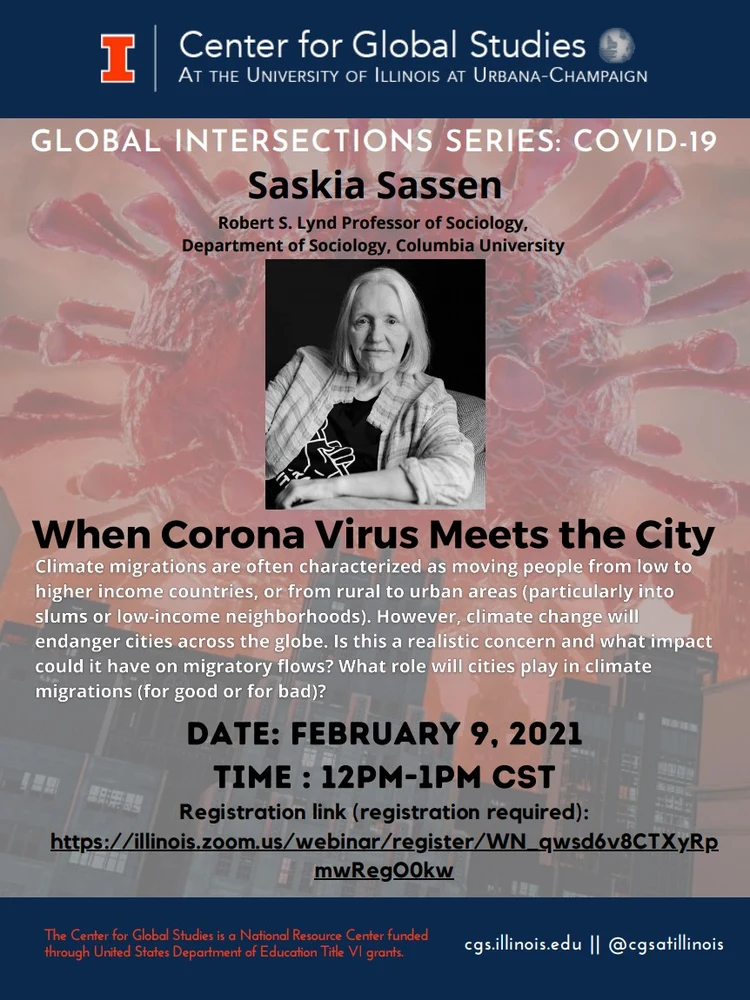
Date: February 9, 2021
Time: 12pm-1pm CST
Speaker: Prof. Saskia Sassen (Columbia University)
Description: Climate migrations are often characterized as moving people from low to higher income countries, or from rural to urban areas (particularly into slums or low-income neighborhoods). However, climate change will endanger cities across the globe. Is this a realistic concern and what impact could it have on migratory flows? What role will cities play in climate migrations (for good or for bad)?
Zoom Recording:
Overflow Questions:
Question 1: You suggested that this is information that citizens should know/that should be made public. What specific criteria or general theories determine (1) what information citizens have the right to know and (2) what information citizens should know?
Answer: That is a long list…Let me emphasize a few key aspects. A) Most citizens in the USA are not necessarily aware of their rights and their obligations as citizens (formal) or as visitors. B) In a country like the Netherlands, Germany and a many others, citizens are far more likely to know the law and the rules than in the USA. Why that is so is a complex issue….But one element is a cultural mode in the USA that is not particularly developed in terms of knowledge of the system…and I am speaking of knowledge we are entitled to know and in fact should know. Educated classes may have lived many generations in the US but that does not necessarily mean that they are well informed about their rights and their obligations as citizens. This type of ignorance in the US always surprises Europeans, or those coming from China or Japan.. etc who know these facts.
Question 2: Would you elaborate on the concept of urbanizing technology? Is there a material example?
Answer: This is an issue that started for me many years ago… when all kinds of firms selling advanced tech to municipal governments were simply often plopping down onto municipal governments what they could not sell to their preferred clients etc…Municipal governments at that time, 30 years or so ago, did not necessarily have staff that could handle it, so the sales people abused them, selling them something they did not even know what to do with… really bad abuse of these mostly poorish municipal governments. By now there tends to be a specialist in tech in any major municipal government.
Question 3: You've made a good case for Cities requiring obsolete and unmaintained large buildings to be reused instead of new development expanding beyond the footprint of the "City". But I also sense that you're saying that vacant land needs also to be managed to prevent new development from occurring at the expense of redeveloping failed buildings inside City limits. Could you speak to what this means for expanding government?
Answer: You understood that well. A city requires elements of all sorts and if you go to Japan, Taipei, major Chinese cities, Seoul you will see far more advanced tech being used by city governments than you see in most cities in the USA. To foreigners this is often shocking and it has to do with the fact that governments do not take that stuff sufficiently seriously and do not want to “waste time and money on municipal governments”, and they are under pressure from powerful actors—the financiers, for instance, who want to make sure that they get what they want and have the pose to insist on their interests, etc, etc.. Again, European cities, advanced Asian cities, are far more modernized than the typical US city…it’s quite surprising to many people.
Question 4: Thank you, Prof. Sassen, for the wonderful talk. How do you think the COVID pandemic would affect the future of cities?
Answer: This is a question that many are asking. It is not clear and most interpretations are either extremely negative on how cities might survive or the opposite: convinced that we’ll be fine eventually. I tend to think we will go back to ‘normal’ though it will be a different type of normal: we will be more aware of our neighbors, we will want to connect with our neighbors because we might need them in a moment of danger/despair/illness…But there is some evidence showing that we might be going back to a more normal mode….At the same time, we will have learnt to take mother nature more seriously… or so I hope!
Question 5: I’m curious about “the eye of the landscape maker”: it seems that you are gesturing towards concerns or dynamics of aesthetic. Are you saying that what the eye is familiar with, or judges to be beautiful, is a constraint?
Answer: Ah nice. Not necessarily a constraint….What I imagine –I cannot measure it or know it for a fact—is that those of us who will have lived through this all, who will have seen the death of young healthy people, and so much more, we will not forget…but that does not mean that we will continuously think of this. No, we will not…we humans are that way—it is probably a safety mechanism or we would go crazy if we were aware of all the illnesses, all the dead, all those who suffer. In that regard, I think our minds have too many items to deal with to fall into deep depressions, some will but not most. History has won us that…